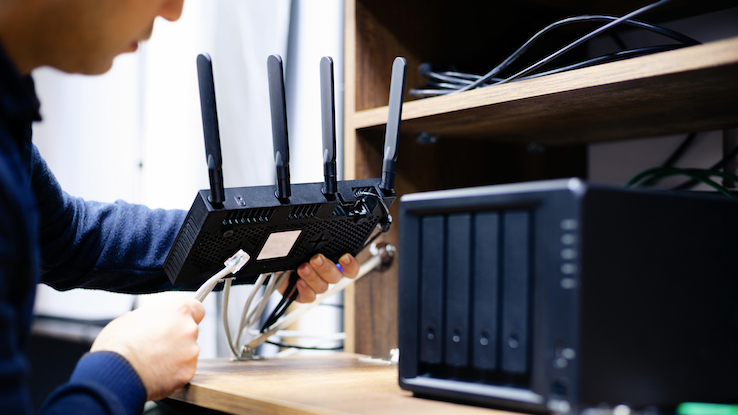What Does a Proxy Server Do?

If you’ve ever worked in an office with a firewall on its computer network, you might’ve heard people discussing proxy servers in relation to network security. Proxy servers help regulate internet traffic to keep data safe and optimize network performance. But how exactly do they work, and what does it have to do with internet security?
If you’ve asked yourself these questions before, you’re in good company. Conceptually speaking, proxies can seem a little abstract — but they’re also very useful tools that can help keep you and your office safer online. To better understand the role of proxies, take a look into what they are, what they do and how some of the different types can be beneficial in different settings.
What Is a Proxy Server, and How Does It work?

A proxy server is a computer system that intercepts internet traffic between your computer (or your computer network) and the internet to help relay your traffic in a more secure way. When you use a proxy server, your internet traffic travels through that proxy server first and then to a website’s server, instead of directly to the server of the website you’re trying to access.
Typically, when you browse the internet, your computer sends requests for data directly to the server of the web address you’re looking at. Your computer and the website’s server communicate and exchange data directly. A proxy server manages that exchange by acting as a sort of gateway between your computer and the web server as they transfer data.
Proxy servers can be helpful for several reasons. They can help keep your identity anonymous by only sharing certain data with the websites you visit. They can also bypass censored or blocked websites, and they can even speed up your internet traffic.
One of the main purposes of a proxy server is to protect your computer from malicious websites and hackers by keeping your most sensitive data — or that of your network — safe. Proxy servers are often used in businesses and schools to help manage traffic and protect the privacy of users on the network. Users can access the internet while the proxy server determines which data to share and which data to hide, ultimately keeping the network secure. For example, if an employee tries to visit a website that contains malware, the proxy server can intercept that request and block the malware from being transferred to the employee’s device.
Types of Proxy Servers

There are three main types of proxy servers: HTTP proxies, SOCKS proxies and HTTPS proxies. HTTP proxies are the most common type of proxy server and can be used to access websites that are blocked by a firewall. SOCKS proxies are used to proxy traffic between two different networks, and HTTPS proxies are used to proxy traffic between a client and a server. Below are some other common types of proxy servers.
Anonymous Proxies: An anonymous proxy server is a computer on the web that functions as an intermediary between your computer and the websites you visit. The benefit of using an anonymous proxy is that it’s more difficult for systems administrators and website owners to track your browsing habits through your IP address. That’s because, when you use an anonymous proxy server, it replaces your IP address with its own before sending your request for information back to the website’s server.
Transparent Proxies: These intercept all requests, whether they use HTTP or HTTPS, and log all the associated information. However, they don’t hide your IP address. A transparent proxy is typically found near the exit of a corporate network. You can find lists of them on some websites. They’re sometimes used to speed up access to resources using previously stored data.
Reverse Proxies: A reverse proxy server redirects your web browsing activity. When you use a reverse proxy server, you don’t directly connect to the website you want to visit. Instead, the proxy server connects to the website and then sends that site’s information back to you. This redirection can serve many purposes, such as caching to speed up browsing, hiding your IP address from the sites you visit, or bypassing filters or firewalls on networks with heavy restrictions. Reverse proxies can also protect entire servers by masking their identities.
Pros and Cons of Using Proxy Servers

Proxy servers offer both advantages and disadvantages depending on how you use them. In some cases, a proxy server can improve security and privacy by shielding your IP address from websites and online services. But, that isn’t always the case. Learn about the pros and cons associated with proxy servers before you decide to utilize one.
Pros
- Protection: Proxy servers can protect your IP address and identity. When connecting to a proxy server, your traffic is routed through the proxy instead of directly to the internet. This can help hide your identity and location from websites and online services.
- Anonymity: In addition to protection, proxy servers also provide anonymity when hiding your IP address. This can be beneficial for security and privacy, preventing websites and services from tracking your activity and associating it with you.
- Performance: Proxy servers can improve website performance by storing static content and reducing the load on the origin server, meaning the sites you access can load faster.
- Censorship: Proxy servers can censor content by blocking certain websites or preventing access to certain files or protocols. This can be useful for employers who want to block access to specific websites during work hours or parents who want to limit their children’s internet access.
Cons
- Security: Proxy servers aren’t strong enough to prevent all attacks from digital sources. Although proxies provide anonymity, they don’t fully encrypt data, meaning they don’t make it unreadable to hackers.
- Cost: Proxy servers come at a cost. The maintenance cost of proxy servers can be very high. There are some free proxies on the internet. But, they can be unreliable, and it’s vital to do your research before choosing one of these.
- Tracking: The cache data that proxies use require passwords and personal information. For shared proxies, the other involved parties can end up misusing this information.
Proxy servers provide safety and privacy by creating a secure connection between two networks. If you’re looking for a simple way to keep outsiders from tracking your activity online or possibly intercepting sensitive personal or professional data at your workplace, consider setting up a proxy server.





